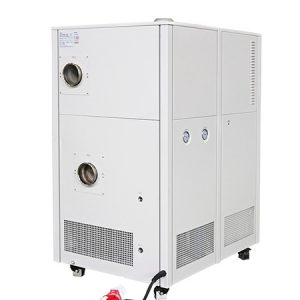¿Con qué instrumentos puede ayudar el refrigerador de recirculación de laboratorio LNEYA?
Laboratory recirculating chillers have a wide range of applications in scientific research and industrial production, providing precise temperature control for various experiments and instruments.
The following are some common scenarios and supporting instruments for chillers in laboratories:
- Spectroscopy equipment: Spectrometers (such as UV visible spectrometers, infrared spectrometers, Raman spectrometers, fluorescence spectrometers, etc.) may require the light source, detector, and sample cell to operate at a constant low temperature to ensure measurement accuracy during optical measurements.
2. Mass spectrometer: Mass spectrometry analysis instruments, including liquid chromatography-mass spectrometry (LC-MS), gas chromatography-mass spectrometry (GC-MS), etc., require cooling in key areas such as ion sources and detectors to reduce noise, improve resolution and stability.
3. Electron microscopy (SEM, TEM): Some electron microscopes require cooling of the electron gun and sample chamber, especially in high-resolution imaging and diffraction modes, to reduce thermal noise and prevent sample blurring due to thermal drift.
4. Laser: Different types of lasers, especially solid-state and semiconductor lasers, require cooling of their laser media and heat dissipation components to prevent overheating, ensure stable laser output, and extend laser lifespan.
5. Vacuum system: The heat generated by vacuum equipment such as molecular pumps and diffusion pumps during operation needs to be cooled by a chiller.
6. Common laboratory instruments: rotary evaporator, distillation device, electrophoresis instrument, fermentation tank, condenser, reaction kettle, etc. The heat generated by these equipment during operation needs to be effectively cooled by a chiller to control reaction conditions and ensure the accuracy of experimental results.
7. Materials Science and Engineering: Semiconductor lasers, vacuum coating machines, nanomaterial synthesis equipment, etc. These high-tech equipment need to maintain a constant low temperature environment during the preparation process.
8. Data collection and analysis: Laboratory data collection systems, electronic devices, and other precision instruments that require temperature control to ensure stable performance.
In summary, laboratory recirculating chillers play an important role in various experiments involving temperature control and high-end precision instruments, ensuring precise control of the experimental process and long-term stable operation of the instruments.
Solicitar un presupuesto
Proporcionar 7 * 24 consulta gratuita y soluciones integrales
Recomendaciones relacionadas
-
enfriadoras hidráulicas enfriadoras industriales/de laboratorio?
1352Los refrigeradores hidráulicos no son directamente equivalentes a los refrigeradores industriales o de laboratorio, pero tienen cierta relevancia y coinciden en su función. Todos ellos son dispositivos utilizados para proporcionar efectos de refrigeración. La principal diferencia radica en la ap...
Ver detalles -
¿Cómo limpiar el sistema de control del aire?
1909In order to respond to the requirements of the two types of society in the country, environmental protection and conservation have become increasingly important. Therefore, in order to extend the life of the product, it is still necessary to have ...
Ver detalles -
Precautions for safe use of heat transfer oil temperature control equipment
1637With the extensive use of thermal oil temperature control equipment, the safe use of thermal oil temperature control equipment is a concern for users. For manufacturers, it is very important to share the precautions for the use of thermal oil temp...
Ver detalles -
Mantenimiento de los 10 mejores congeladores industriales
1806Cuando elegimos y compramos congeladores industriales de las 10 mejores marcas, además de algunas necesidades necesarias, también debemos prestar atención al uso y mantenimiento del congelador industrial, debemos seleccionar congeladores industriales con larga vida útil, alta ...
Ver detalles
 LNEYA Enfriadoras industriales Fabricante Proveedor
LNEYA Enfriadoras industriales Fabricante Proveedor












Someter a consulta
Le responderemos en 24 horas